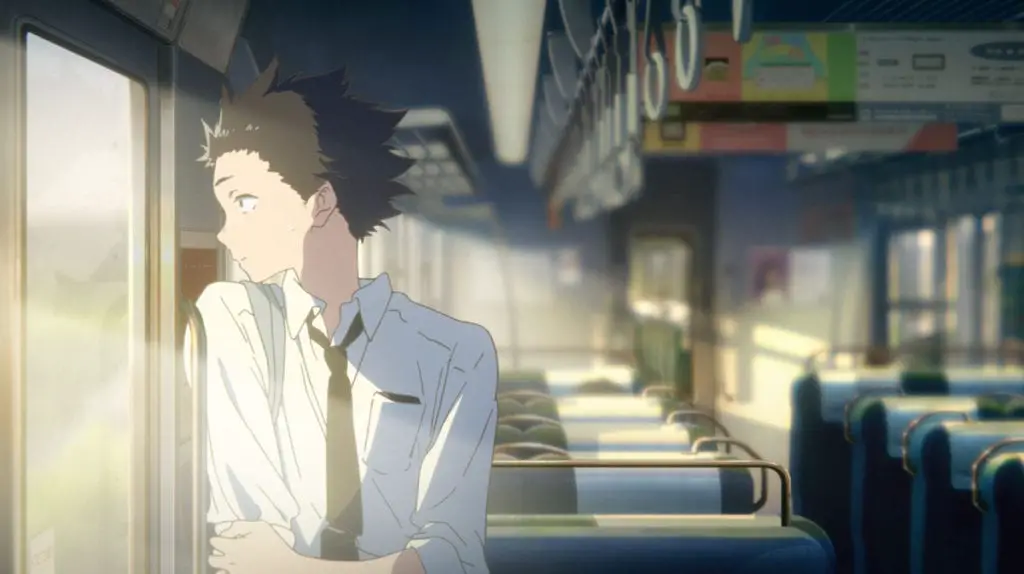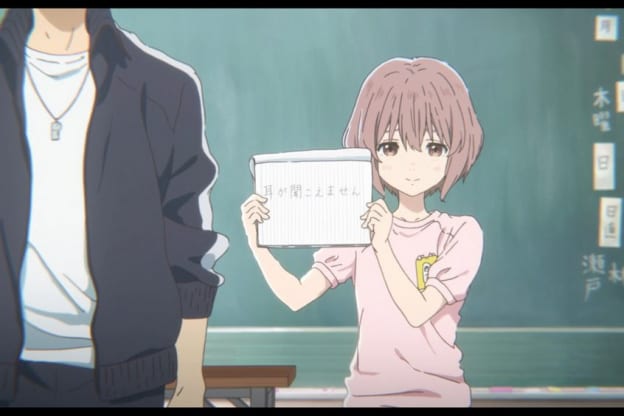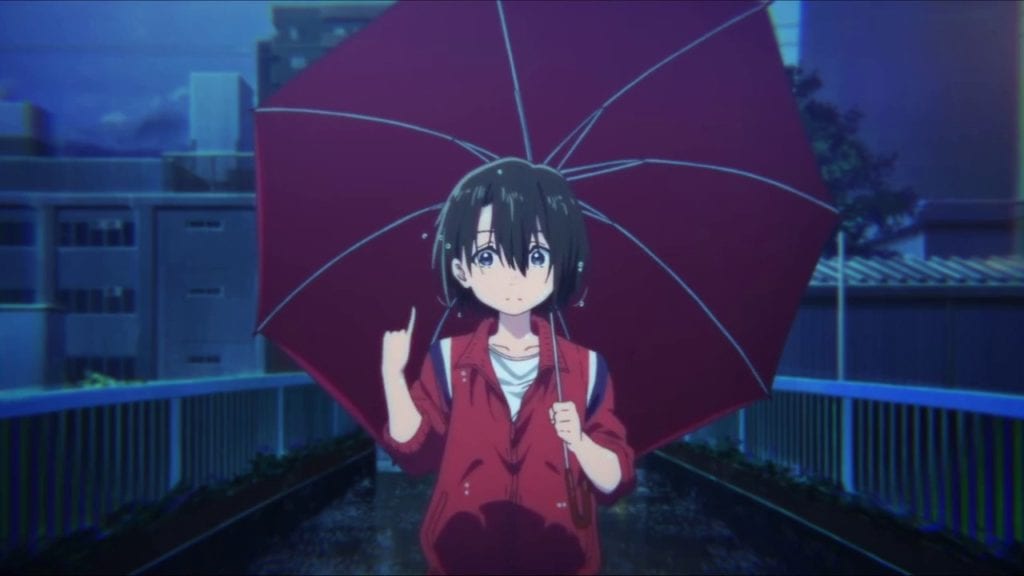It is October! The month of autumnal leaves and spooky things! And that’s why we won’t talk about any of these things. Rather, in a new episode of I end up watching a Japanese animated teen drama that makes me ugly cry, I recently saw A Silent Voice. This movie, which had to wait two years before being legally distributed in France, is a little jewel.
Among a lot of things the movie is beautiful, emotional (hence the ugly crying), has great character, an amazing cast, and a great, character-driven story. It was directed by Nakoa Yamada, written by Reiko Yoshida, and adapted from a manga by Ōima Yoshitoki that came out in Japan in 2016. I want to highlight that all three are women. It is a little thing but I noticed that a lot of the Japanese animation I watch is created by men.
Considering all this I think I gave a certain number of good reasons to watch A Silent Voice. However there are peculiarities to this movie that make it stick with me particularly. And that’s why I am talking about it today.
The Story
A Silent Voice is a coming of age story. I love this kind of story especially when they deal with not ‘fitting in’ and how to find one’s place in the world. And that is what A Silent Voice does.
The story follows seven children/teenagers and also a bit of their family too. The two main protagonists are Shoya and Shoko, and the story is mainly from Shoya’s perspective. Shoya and Shoko met in primary school. Shoko was new and ended up being bullied by her new classmates mainly because she is deaf. Shoya was among the leader of the bullies. When the adults in charge started to realize that something was wrong in the class (or rather when the adults had no choice but face it since Shoko’s mother put their nose in it), they confronted it so poorly that Shoko ended up changing schools and the bullying started to target Shoya rather than stop.
At the beginning of A Silent Voice, Shoya is a teenager who has no friends in high school, or outside of it, and has completely shut himself off from social interaction. To be perfectly clear, the movie starts with Shoya leaving his home to go kill himself. He changes his mind at the last minute and instead goes on a quest to make amends to Shoko.

From this moment onward, A Silent Voice turns into a lesson on growing up, apologizing, letting people in, forgiving (especially one’s self), self-love, and simply love, be it filial, between friends, or romantic.
A Silent Voice and forgiving
I can hear some of you having second thoughts: “the redemption arc of a bully really?” And yes, A Silent Voice deals with the redemption arc of bullies. Plural. But it does it properly. It is not just about feeling sorry for yourself, it is about doing the right thing. You are supposed to help the people you have hurt in order for them to get better. And you should not be mad when the person isn’t exactly responding to your action as you wish. It is about growing up not only to become an adult but also to become a better person.
A Silent Voice talks about forgiving people who have grown up to become better. But it is also about forgiving yourself for what you have done/what you are and accepting that you might deserve love/friendship. And this include self-love.
At no moment does the movie excuse or minimize the violence of bullying (or the other type of violence we can inflict on each other), but its message is incredibly optimistic. With work, patience, and love, people, and especially teenagers, can become their best selves.
A Silent Voice and not fitting in
Anxiety about ‘fitting in’ or rather ‘not fitting in’ is a part of nearly everyone’s youth. It is not a surprise to see it treated in a movie like A Silent Voice. However, I will say that the movie is more ambitious than other movies of the same kind, because it gives real reasons for its characters to not fit in. While a lot of movies deals with main characters that are average and a bit quirky, A Silent Voice‘s two main protagonists have concrete reasons to believe they won’t fit in.
First, Shoko has a disability and that’s why other students pick on her. Her disability makes her life harder. She faces social rejection that leads her to self-hate. Not a lot of movies have protagonists with disabilities. In a similar way, not a lot of movies show that the majority of their struggles come from society making them feel as if they aren’t good enough. Shoko is someone who tries. She makes a lot of effort so the others aren’t ‘burdened’ by her disability. But in the end the key to her happiness is to accept herself, not to make herself more convenient. I love Shoko and I wish I came upon characters like her more often.

Surprisingly, Shoya also has good reason to fear rejection. Even if it is less obvious than Shoko, Shoya isn’t the archetype of what Japan is expecting of a young man. He is shy, unconfident, and not very polite (he isn’t rude like he was as a child, but he isn’t a model of courtesy either). His family isn’t ‘ideal’ either. His father isn’t there, and I don’t think he is dead (there isn’t any autel in his family home). His sister has married a foreigner (and not a white one). Finally, I don’t think they are rich. Any or all of these might be reasons why the bullying turned against him and not against another child once Shoko had left.
Presenting these characters allows A Silent Voice to deals splendidly with the not ‘fitting in’ theme. And I could never thank the writers of the story enough for offering a happy ending to Shoya and Shoko’s story. First, because my heart would not have supported the alternative, and second, because I think we need this kind of story.
A Silent Voice and bullying
Finally, one of the great strengths of A Silent Voice is it’s treatment of bullying. We already saw that it avoid taking the road of “anyone can be bullied,” which isn’t true. But it does two other things particularly well: it takes into account the long-term damage bullying causes, and it talks about how the treatment of bullying by adults can make things worse.
Both Shoko and Shoya suffer from massive trust issues due to the bullying they suffer. Trust issues that are explicitly represented in the movie for Shoya (animation is perfect for this kind of visual metaphor). These trust issues have an impact on their mental health. After all, without giving any spoilers, Shoya is suicidal. It has also an important impact on their family. It is particularly visible with Shoko’s family. For example, her little sister, Yuzuru (my favorite character), is extremely defensive of her big sister. To the point of maybe sidelining her own life.

Finally, the adult intervention. Except for Shoko’s mother (who has her faults in the way she deals with it even if she actually wants to protect her daughter) adults in A Silent Voice seem very happy to ignore the problem of the children/teenagers they should take care of. It is particularly evident with Shoko and Shoya’s primary school teacher. Not only does he directly witnesses the bullying and do nothing to prevent it, he is the one to throw Shoya under the bus for it. Bullying happens because we as a society let it happen. It isn’t something that happens in the shadows and as an exception. It is something the person in charge can unconsciously encourage. A Silent Voice describes this masterfully.
Conclusion
A Silent Voice is an exquisite movie. Not only is it well made, it is also beautiful in all its artistic aspects (click here to listen to the main theme). It has great characters and a great emotional story.
But most importantly, it treats ambitious themes in a coming of age story and it does so in the right way. Give A Silent Voice a try. You won’t be disappointed.

